Talking to your healthcare provider about adult diaper use can be delicate. While it might seem like an uncomfortable conversation, you must find the courage to ask important questions.
Talking about adult diaper use with your healthcare provider can be daunting, but it is important. Having the right information can make all the difference for yourself or a loved one. We’ll compile some tips and pointers to help you talk to your healthcare provider about adult diaper use. We will also discuss the benefits and drawbacks of adult diaper use and key questions you should ask your healthcare provider.
However, we understand that this topic can be sensitive, but remember that having an open conversation with your healthcare provider can significantly improve your quality of life. We will also discuss what to do if your healthcare provider is not supported and how you can advocate for yourself.
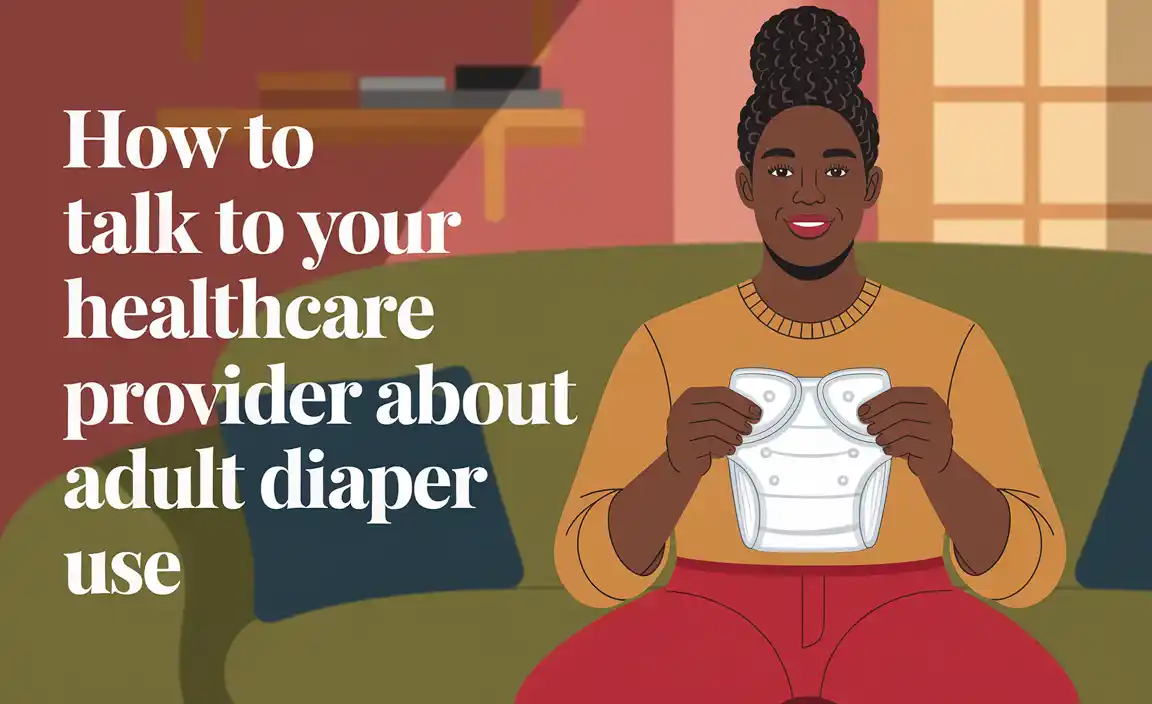
Tips To Help You Talk To Your Healthcare Provider About Adult Diaper Use

For people with incontinence, disabilities, or medical conditions, wearing adult diapers is a practical solution to keep them hygienic, comfortable, and stress-free. But discussing this with your healthcare provider can be difficult. However, conversing with them is crucial to receiving the right care and assistance.
Discuss your needs, medical history, medication schedule, and symptoms. Based on your information, they can help you manage your condition and avoid frequent bathroom trips. They can also provide tips on keeping your skin clean and preventing diaper rash, which can occur in some individuals.
Remember, wearing adult diapers does not have to be a taboo subject. Instead, it can be an open, honest conversation leading to better self-care and a more comfortable life. If you have a cognitive impairment, such as dementia, don’t hesitate to seek advice and support from your healthcare provider.
1. Identify Your Healthcare Goals
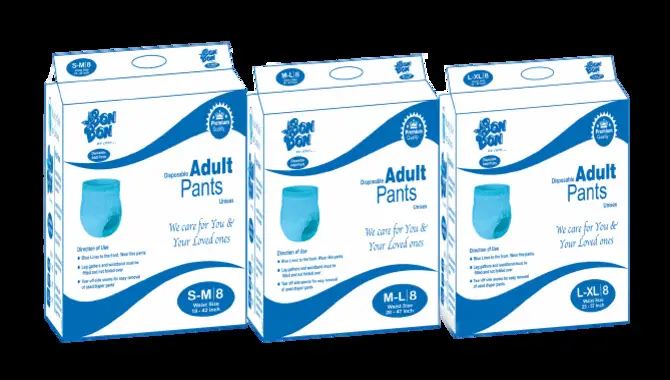
Before starting a diaper use regime, it is important to identify your healthcare goals. These may include managing incontinence or preventing urinary tract infections (UTIs). These goals will help you determine the right adult diaper use regimen.
Consider the pros and cons of using diapers, such as hygienic or cost considerations. You should also inform your provider if you are undergoing medical or surgical treatment and may need to adjust your treatment plan. In addition to identifying your goals, they can provide guidance and support as you explore options for adult diaper use.
Evaluating the pros and cons of adult diaper use is important in determining whether it is right for you. Finding the right fit with a diaper use regimen can take time and involve continuous monitoring of your health conditions. The provider can be a valuable resource for this process by answering questions and providing resources for further information.
2. Discuss Treatment Options
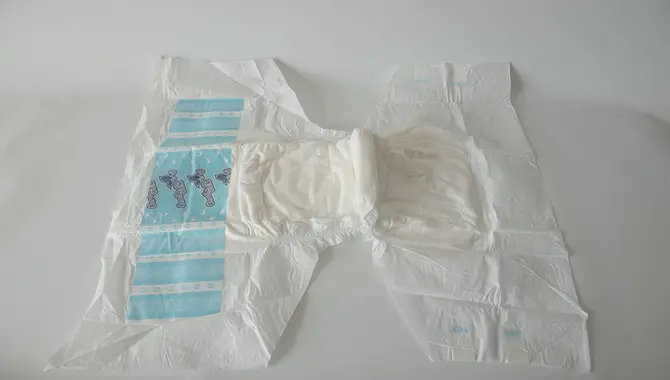
When discussing adult diaper use with your healthcare provider, discussing the pros and cons of any treatment options you are considering is important. Your healthcare provider can help you determine your best action, such as changing your diet, lifestyle, medications, or other treatments. They can also provide valuable guidance and support throughout the process.
Your healthcare provider can also help you understand the various types of adult diapers and how they work and inform you about their availability and cost. They can provide recommendations for safe and effective adult diaper use, including how to select the best product for you.
In addition to this, they can also assist in troubleshooting common problems such as odor or leakage. Finally, it is essential to take note of any side effects that may occur after using adult diapers. These could be signs of a more serious condition that needs to be addressed by a healthcare professional.
3. Discuss Risks And Side Effects
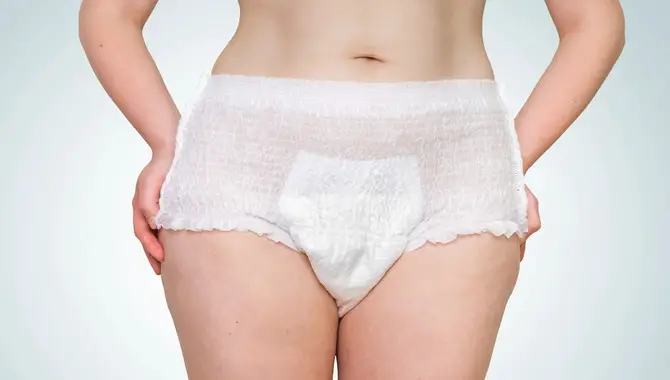
When discussing adult diaper use with your healthcare provider, being honest about your fluids, medications, and other substances intake is important. You should also be aware of any known risks or side effects that could occur as a result of adult diaper use.
These include potential skin problems such as irritation or infections. Another potential risk is the inability to remove an adult diaper properly, leading to urinary tract infections or other medical conditions. It is also important to note that some patients may be more likely to experience these issues than others, so it is important to pay close attention to your body’s signs and symptoms if you notice anything unusual.
4. Encourage Continued Communication
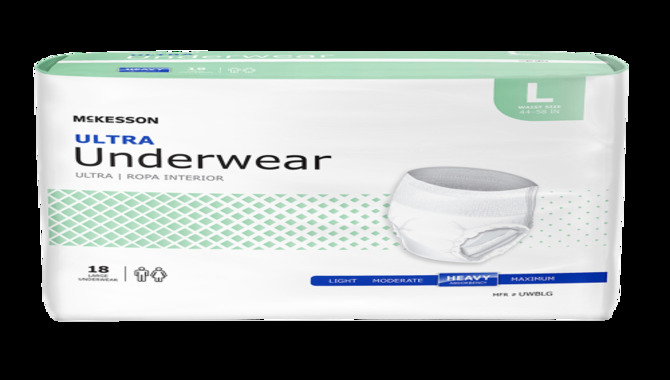
Trust is an important aspect of any doctor-patient relationship. Your doctor will take care of your health and well-being, but they will also help you manage any health conditions you face. To maintain a strong relationship, being open and honest with your doctor is important. Your doctor may encourage you to use adult diapers for your treatment plan.
You could do this through education or medication adjustments. Encouraging continued communication is vital in maintaining a good doctor-patient relationship. It helps ensure that all questions, concerns, and ideas are addressed and considered by the professional. You can be open and honest about your needs, desires, and choices. Ultimately, you will build trust between you and your healthcare provider, which leads to better care and outcomes for both of you.
What Are The Benefits And Drawbacks Of Adult Diaper Use?
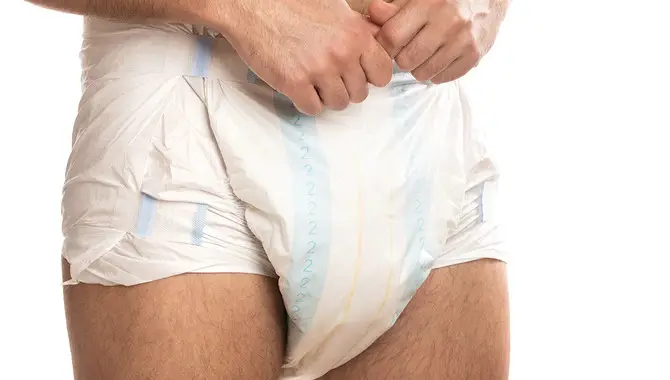
Adult diaper use can be a solution for those who experience incontinence, a common problem affecting millions of adults. It provides individuals with the protection they need from leaks and can help simplify everyday life. Wearing adult diapers can offer comfort, discretion, and convenience for those who experience incontinence.
However, it can also cause embarrassment, affect dignity, and may have drawbacks such as cost, stigma, and potential skin irritation. Before deciding about adult diaper use, discussing the benefits and drawbacks with a healthcare provider is recommended. They can help you weigh the benefits and drawbacks and find the best solution.
What Questions Should You Ask Your Healthcare Provider About Adult Diaper Use?

If you are experiencing regular incontinence, it is advisable to consult with your primary care provider for evaluation and diagnosis. They can prescribe physical therapy, medication, or other treatments for your condition. Sometimes, people with incontinence may need adult diapers for additional support. Remember that Medicare Part B generally does not cover the cost of incontinence supplies like adult diapers.
Absorbent products come in various forms, sizes, and capacities; choosing one that provides the right protection for your needs is essential. Consult with your healthcare provider to determine which type is best for you. This is a common and treatable condition, and there is no need to be embarrassed or ashamed. Your healthcare provider can help you manage incontinence effectively and with dignity.
Why You Should Talk To Your Healthcare Provider

Adult diapers are a crucial necessity for those with urinary or fecal incontinence, cognitive impairment, or mobility issues and can improve the quality of life for those who wear them. For those who suffer from persistent incontinence, seeking a healthcare provider’s evaluation for treatment options, including using adult diapers, is important.
It’s essential to note that if you have Medicare Part B insurance, it covers medical treatments for incontinence but not adult diapers. More than 25 million Americans suffer from incontinence, which is treatable with physical therapy, medication, or hygienic products, including adult diapers.
Conversation with your healthcare provider is essential when finding the best solution for your incontinence needs. They can provide invaluable advice and guidance to make using adult diapers comfortable and beneficial to your daily life. Feel free to discuss adult diaper use with your healthcare provider.
What Should You Do If Your Healthcare Provider Is Not Supportive?

Sometimes healthcare providers may not be familiar with incontinence or may not consider adult diaper use as a viable solution. If your healthcare provider is not supportive of adult diaper use, it’s important to communicate your concerns and need for support.
Explain how incontinence impacts your quality of life and discuss the potential options to treat the underlying conditions. You can treat incontinence with physical therapy, medication, or hygienic products like adult diapers. Remember that many healthy adults use adult diapers for medical reasons, and people with conditions like dementia might require them for daily care.
Incontinence products come in various sizes and capacities to provide comfort and ease of use. Having an open conversation with your healthcare provider is important to find a solution that works for you and promotes your overall well-being.
Conclusion
As a healthcare provider, you are responsible for ensuring your patients access high-quality care. Talking to your healthcare provider about adult diaper use can be intimidating, but it’s important for your health and comfort. Start by finding a healthcare provider you trust and feel comfortable talking to.
Educating patients on adult diaper use ensures their overall health and well-being. Discuss the benefits and drawbacks of adult diaper use, and ask any questions. Remember that your healthcare provider is there to help you, so don’t be afraid, to be honest and open.
If your healthcare provider is not supportive, don’t give up. Seek out a second opinion or try a different healthcare provider. Taking care of your health and comfort is crucial, and your healthcare provider can be an essential partner in your care. For more tips on navigating this sensitive conversation on our other website, see.
Frequently Asked Questions:
[rank_math_rich_snippet id=”s-5387e647-c0c6-47f6-bbca-b7da31c43b69″]
